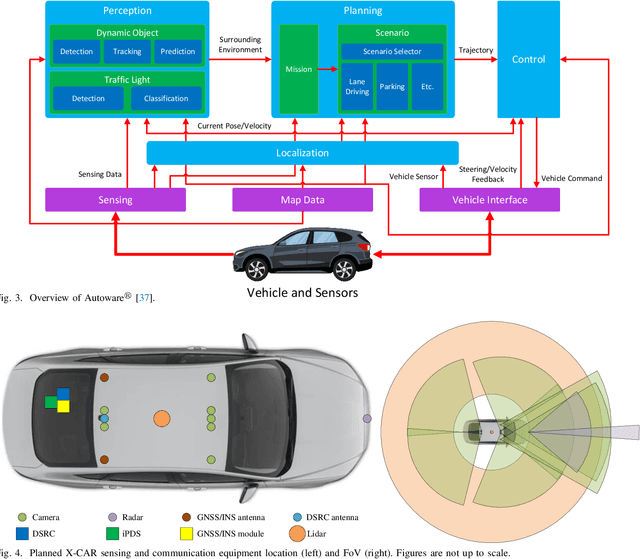Prasenjit Ghorai
Pedestrian Trajectory Forecasting Using Deep Ensembles Under Sensing Uncertainty
May 26, 2023Abstract:One of the fundamental challenges in the prediction of dynamic agents is robustness. Usually, most predictions are deterministic estimates of future states which are over-confident and prone to error. Recently, few works have addressed capturing uncertainty during forecasting of future states. However, these probabilistic estimation methods fail to account for the upstream noise in perception data during tracking. Sensors always have noise and state estimation becomes even more difficult under adverse weather conditions and occlusion. Traditionally, Bayes filters have been used to fuse information from noisy sensors to update states with associated belief. But, they fail to address non-linearities and long-term predictions. Therefore, we propose an end-to-end estimator that can take noisy sensor measurements and make robust future state predictions with uncertainty bounds while simultaneously taking into consideration the upstream perceptual uncertainty. For the current research, we consider an encoder-decoder based deep ensemble network for capturing both perception and predictive uncertainty simultaneously. We compared the current model to other approximate Bayesian inference methods. Overall, deep ensembles provided more robust predictions and the consideration of upstream uncertainty further increased the estimation accuracy for the model.
X-CAR: An Experimental Vehicle Platform for Connected Autonomy Research Powered by CARMA
Apr 06, 2022



Abstract:Autonomous vehicles promise a future with a safer, cleaner, more efficient, and more reliable transportation system. However, the current approach to autonomy has focused on building small, disparate intelligences that are closed off to the rest of the world. Vehicle connectivity has been proposed as a solution, relying on a vision of the future where a mix of connected autonomous and human-driven vehicles populate the road. Developed by the U.S. Department of Transportation Federal Highway Administration as a reusable, extensible platform for controlling connected autonomous vehicles, the CARMA Platform is one of the technologies enabling this connected future. Nevertheless, the adoption of the CARMA Platform has been slow, with a contributing factor being the limited, expensive, and somewhat old vehicle configurations that are officially supported. To alleviate this problem, we propose X-CAR (eXperimental vehicle platform for Connected Autonomy Research). By implementing the CARMA Platform on more affordable, high quality hardware, X-CAR aims to increase the versatility of the CARMA Platform and facilitate its adoption for research and development of connected driving automation.
 Add to Chrome
Add to Chrome Add to Firefox
Add to Firefox Add to Edge
Add to Edge